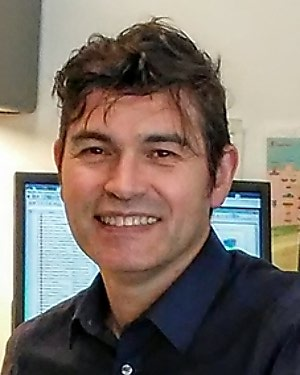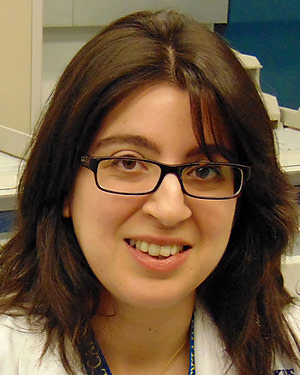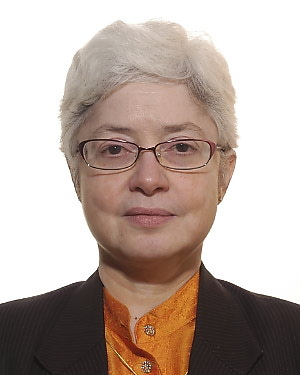Research Lab Results
-
Brain Tumor Laboratory
At the brain tumor laboratory, Henry Brem, M.D. and Betty Tyler, along with more than 350 trainees, have conducted scientific research, contributed to scientific literature, amended clinical practice, and illuminated new pathways for improving clinical outcomes.
The laboratory has advanced the understanding of gene therapy, angiogenesis, intracranial implantation of biodegradable polymers to treat malignant glioma, tumor genetics and proteomics, microchip drug delivery and drug resistance studies. Dr. Brem and his colleagues have designed and led many multi-institutional clinical trials to improve and expand the range of therapeutic options for patients with brain tumors. -
Brain Tumor Genetics Lab
Led by Dr. Chetan Bettegowda and Dr. Jordina Rincon-Torroella, our lab uses genetic analysis, biomarkers and patient outcome data to identify better ways to diagnose and treat disease. We research a variety of neurological conditions, including central nervous system tumors, trigeminal neuralgia and traumatic brain and spinal injuries. -
Chordoma Lab
Chordoma research is led by a comprehensive team including Gary Gallia, M.D., director of the Neurosurgery Skull Base Tumor Center. The laboratory focuses on developing new therapies for brain and skull base tumors, and has established the first primary skull base chordoma xenograft mouse model. The team is also exploring high throughput drug screening using the chordoma model, and the molecular pathways responsible for tumor maintenance and growth. -
Brennen Lab
The Brennen laboratory takes a rigorous, multi-disciplinary, team-based approach towards developing innovative therapeutic and prognostic strategies for prostate cancer with an emphasis on exploiting vulnerabilities within the tumor microenvironment towards this goal. To accomplish this goal, we are strategically pursuing novel therapeutic platforms, including stromal-targeted prodrugs, protoxins, and radiolabeled antibodies, in addition to cell-based therapy and drug delivery; all of which are designed to reduce toxicity to peripheral non-target tissue (i.e. side effects) while maximizing anti-tumor efficacy (i.e. therapeutic benefit). Currently, many of these strategies are focused on overcoming stromal barriers to anti-tumor immune responses such that men suffering from prostate cancer can share in the immense, revolutionary power of immunotherapy that is transforming care for many with advanced disease in other tumor types previously thought to be unmanageable using conventional approaches. Unfortunately, prostate cancer has largely proven refractory to these powerful approaches thus far and requires novel mono- or combinatorial treatment strategies to unleash the full potential of the immune system and generate personalized anti-tumor responses with the capability of producing long-term durable responses or even cures in these men.
-
Eberhart, Rodriguez and Raabe Lab
Utilizing a combination of tissue-based, cell-based, and molecular approaches, our research goals focus on abnormal telomere biology as it relates to cancer initiation and tumor progression, with a particular interest in the Alternative Lengthening of Telomeres (ALT) phenotype. In addition, our laboratories focus on cancer biomarker discovery and validation with the ultimate aim to utilize these novel tissue-based biomarkers to improve individualized prevention, detection, and treatment strategies. -
Lei Zheng Lab
Zheng’s research focuses on two R01-funded projects; first, the group has developed a pancreatic cancer immunotherapy research program on a neoadjuvant therapy platform as well as a number of preclinical models of pancreatic cancer for developing innovative immunotherapy strategies. The group has applied the knowledge gained from pancreatic cancer immune-based therapies to the development of a colorectal cancer GVAX vaccine. Second, the group is aimed at understanding the mechanistic roles of the tumor microenvironment in cancer development and metastasis and identifying new targets for pancreatic cancer therapies by dissecting the tumor microenvironment of pancreatic cancer. -
Franck Housseau Lab
The Franck Housseau Lab focuses on the role of the microbiome in colorectal tumorigenesis and on developing a better understanding of the tumor immune microenvironment. The lab is currently working to define the biomarkers of a pre-existing antitumor immune response in metastatic colorectal cancer to define a population of patients eligible for checkpoint blockade therapies.
-
Head and Neck Cancer Clinical Trials and Tissue Bank
The Johns Hopkins Head and Neck Cancer Tissue Bank enrolls patients and collects research specimens from Head and Neck Tumor patients, both cancerous and benign, with particular focus on Head and Neck Squamous Cell Cancer patients. It provides specimens to researchers both within the institution and outside.
Principal Investigator
Department
-
In-vivo Cellular and Molecular Imaging Center
The In-vivo Cellular and Molecular Imaging Center conducts multidisciplinary research on cellular and molecular imaging related to cancer. We provide resources, such as consultation on biostatistics and bioinformatics and optical imaging and probe development, to understand and effectively treat cancer. Our molecular oncology experts consult on preclinical studies, use of human tissues, interpretation of data and molecular characterization of cells and tumor tissue. -
Molecular Oncology Laboratory
Our Molecular Oncology lab seeks to understand the genomic wiring of response and resistance to immunotherapy through integrative genomic, transcriptomic, single-cell and liquid biopsy analyses of tumor and immune evolution. Through comprehensive exome-wide sequence and genome-wide structural genomic analyses we have discovered that tumor cells evade immune surveillance by elimination of immunogenic mutations and associated neoantigens through chromosomal deletions. Additionally, we have developed non-invasive molecular platforms that incorporate ultra-sensitive measurements of circulating cell-free tumor DNA (ctDNA) to assess clonal dynamics during immunotherapy. These approaches have revealed distinct dynamic ctDNA and T cell repertoire patterns of clinical response and resistance that are superior to radiographic response assessments. Our work has provided the foundation for a molecular response-adaptive clinical trial, where therapeutic decisions are made not based on imaging but based on molecular responses derived from liquid biopsies. Overall, our group focuses on studying the temporal and spatial order of the metastatic and immune cascade under the selective pressure of immune checkpoint blockade with the ultimate goal to translate this knowledge into “next-generation” clinical trials and change the way oncologists select patients for immunotherapy.






